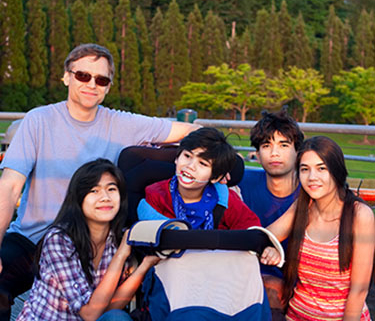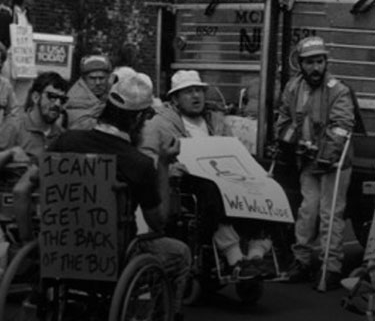Archive for year: 2019
Take Action
/in Home post slider/by The ArcOur Position Statements
/in Mission & Values Post Slider/by The ArcOur History
/in Mission & Values Post Slider/by The ArcAbout Us
/in Mission & Values Post Slider/by The ArcThe Arc Condemns Deteriorating Treatment of Unaccompanied Minors in US Custody
/in Public Policy/by The ArcRecent reports indicate that the federal government will restrict or cancel educational, recreational and legal services for thousands of children held in government migrant shelters.
These practices are cruel and misguided. Research shows that trauma in childhood can have serious and lifelong consequences. There is no evidence indicating that any time in detention is safe for children. As the American Academy of Pediatrics has stated, recreational and social enrichment activities, such as opportunities for physical activity and creative expression, may alleviate stress and build resilience and should be part of any program for detained children. Adequate recreational and educational activities for children being held in these shelters is both the necessary and compassionate course of action. These services and activities are central to childhood development and wellbeing and their absence, particularly for an extended period, may cause long-term losses.
Reports also indicate that these children will no longer have access to legal services. The Arc believes that children and families should have access to legal counsel throughout the immigration pathway, and unaccompanied minors should have free legal counsel with them for all appearances before an immigration judge. Adequate legal services must be restored immediately.
We call on the federal government to ensure that these children are treated with dignity and respect, with access to educational, recreational and legal services, and not subjected to conditions that may cause harm. At minimum, children deserve protection from additional traumatization in the United States. We remain deeply concerned about the impact this will have on children with and without disabilities.
Spotlight on Grief and Aging: Mark Keeley and Mary Anne Tolliver, St. Louis Arc
/in From Our Chapters, Programs and Supports/by The ArcToday, with advances in medical care, deinstitutionalization, and people working and living more productive lives, individuals with I/DD are living much longer. Mark Keeley, President and CEO of the St. Louis Arc, recognized the growing needs of this aging population and committed to better serve and support them. Under the leadership of Mary Anne Tolliver, Director of Aging Services, Dautel Circle has become the premier retirement community for seniors with I/DD.
Tell us about the grief and loss work that you do at your chapter.
Mark: Many people we support are living well into their 70s and 80s, and are outliving loved ones, including their parents. It is crucial to recognize the losses people with I/DD endure across the span of their lives.
Education of staff is paramount to guide them and the people they are supporting through the grief process. The goal is to understand what grief can look like, as it does not look the same from person to person, know how to respond to each individual’s loss, or just “be with them” to listen and provide support. The journey to the end of life can be extended or abrupt. Explaining what to expect through the grieving process and what is occurring can be especially helpful to someone with I/DD. Grief counseling also gives individuals with I/DD the mechanism to express their loss and sadness.
Since many of the aging individuals we support have declining health and decreases in cognitive and physical abilities, we are changing our supports around them. We have instituted a Holistic Aging Review committee to both meet funder due process responsibilities and provide a holistic review with an interdisciplinary team approach. The committee is designed to provide guidance and recommendations on medical/health concerns, medication review, behavior supports, restrictions, adaptive devices, and staff training for skill development and education. In addition to the review committee, we also provide grief counseling, support groups and hospice, and palliative care.
How do prepare someone with I/DD for the news of a loved one being sick or facing a terminal illness? How do you support someone with I/DD facing end of life themselves – and how do you support their family?
Mary Anne: The best practice we have found is being honest with the person affected about what is happening to them or to their loved one. We do this through words or pictures to help them understand. When discussing or explaining, it may not always be about a specific ailment or situation, but more about the understanding that their family member, friend, or housemate will no longer be here. We provide grief counseling to residents, staff, and families through our therapist, our Employee Assistance Program, and hospice and palliative care. Understanding their spiritual, religious, and cultural beliefs helps us to guide them through their grief. It is important to not push our own beliefs onto them but be a guide through this journey with their beliefs and understanding of death. We try and make sure the families are involved in decisions, spend quality time with their loved one, and have the opportunity to say goodbye. We also encourage families to include their loved one’s friends and housemates in the process so they can express their feelings and understand their grief.
Do you partner with health care professionals? If so, has the exposure helped build awareness and competency working with the disability community?
Mark: We have a long-term partnership with a primary care physician who consults with our RNs and who also provides care for many of our residents. We have also partnered with Visiting Nurses Association for hospice care for our residents. VNA understands the regulations we need to follow and works with us to provide the best possible care for our residents within their own homes.
What advice do you have for chapters who want to provide aging services/supports, but don’t have a program started yet?
Mary Anne: Aging, loss, and death are a natural process of life. People with I/DD grieve the loss of a loved one just as the rest of us do. Providing support, respect, and inclusion in the process of loss and grief and not sheltering someone with I/DD from this life experience is vital. Initiating a Holistic Aging Review committee, identifying or employing a reputable, credentialed grief counselor, and educating staff through professional training on aging and dementia is paramount to being able to accommodate these individuals through the natural progression of life and loss.
The Arc Responds to Reports on Widespread Use of Solitary Confinement for Immigrant Detainees, Including People With Disabilities
/in Public Policy/by The ArcWashington, DC – This week, reports have surfaced documenting that thousands of immigrants have been trapped in solitary confinement in immigration detention centers, often based solely on their disability status or their gender identity.
“These atrocious reports of cruel confinement in isolation, without necessary services, in circumstances that are traumatizing and dangerous to the people involved, are unacceptable.
“Non-citizens with any type of disability should have a fair opportunity to enter and reside legally in the United States and to become citizens, without unnecessary or discriminatory restrictions based on their disability, gender identity or expression, or sexual orientation. We must also ensure that individuals with disabilities who are facing deportation or other legal action are provided with appropriate representation, due process protections, and reasonable accommodations and that they are not unnecessarily segregated in immigration facilities.
“We have already seen proposals like the public charge rule that would discriminate against immigrants with disabilities, making it harder to legally enter or remain in the country. We continue to condemn these policies and practices and call on Members of Congress, as they have done in the past, to stand up for people with intellectual and developmental disabilities and their families as they seek inclusion in America. We will continue to promote and protect equal rights of children and adults with disabilities in all parts of the world, and call on our government to ensure that, at minimum, people should not be subject to harm while they are held under the care and authority of this country,” said Peter Berns, CEO, The Arc.
The Arc advocates for and serves people with intellectual and developmental disabilities (I/DD), including Down syndrome, autism, Fetal Alcohol Spectrum Disorders, cerebral palsy and other diagnoses. The Arc has a network of over 600 chapters across the country promoting and protecting the human rights of people with I/DD and actively supporting their full inclusion and participation in the community throughout their lifetimes and without regard to diagnosis.
Editor’s Note: The Arc is not an acronym; always refer to us as The Arc, not The ARC and never ARC. The Arc should be considered as a title or a phrase.
Amended Budget Proposal Saves Special Olympics but Not All Other Disability Program Cuts
/in Press Releases/by The ArcWashington, DC – This week, President Trump sent to Congress an amended budget proposal which included money for Special Olympics, reversing an attempt to cut the funding. However, many other cuts that could impact the lives of people with intellectual and developmental disabilities (I/DD) are still in the President’s budget request.
“Funding for the important work of Special Olympics has broad support in Congress and amongst the public. But so does funding for a host of other programs that support people with intellectual and developmental disabilities to thrive in the community.
“It’s not too late for the President to go further and reverse course on his proposal to cut Medicaid, the core program providing access to health care and home and community-based services for people with disabilities. Or his plan to impose work requirements to be eligible for the program. Or any of the other cuts proposed that could impact access to job training, maternal and child health, or caregiver support, to name a few.
“What we invest in reflects our values as a society. There’s a lot at stake for people with disabilities in the budget process in Washington, and there’s still time to make the right investments that keep up the progress we’ve made in access to services and supports across the lifespan, “said Peter Berns, CEO, The Arc.
The Arc is particularly concerned about the proposed cuts to Medicaid, which come in the same form as those included in the 2017 proposals to repeal the Affordable Care Act (ACA) and cut and cap the Medicaid program. Congress rejected this in 2017, but the Administration proposed budget includes replacing both the Medicaid expansion and ACA subsidies with a block grant, and converting the rest of Medicaid into a per capita cap which would deeply cut the program and cap the amount of funding available. The end result of these proposals being put in place would be less money for states, restrictions on eligibility, cuts to services, and growing waiting lists.
The Arc has compiled information about the Administration’s budget request as it pertains to programs that provide services and supports for people with I/DD and their families.
The Arc advocates for and serves people with intellectual and developmental disabilities (I/DD), including Down syndrome, autism, Fetal Alcohol Spectrum Disorders, cerebral palsy and other diagnoses. The Arc has a network of over 600 chapters across the country promoting and protecting the human rights of people with I/DD and actively supporting their full inclusion and participation in the community throughout their lifetimes and without regard to diagnosis.
Editor’s Note: The Arc is not an acronym; always refer to us as The Arc, not The ARC and never ARC. The Arc should be considered as a title or a phrase.
The Arc’s Concerns About Changes at the Administration for Community Living
/in Public Policy/by The ArcThe Arc was concerned to read the Notice Statement on the reorganization of the Administration for Community Living (ACL) published in the federal register. As the “the principal agency in the department designated to lead aging and disability programs,” ACL must have sufficient resources, support and clarity in its goals to be successful in this role. ACL has been a leader and key partner on a range of essential issues, including protecting the rights of people with disabilities and older adults, preventing abuse and neglect, supporting needed systems change activities, promoting promising practices in home and community-based services, implementing person-centered planning, and providing a range of technical assistance to states and other stakeholders, among many others.
ACL must continue to support programs and policies that advance community living for older adults and people with disabilities of all ages and facilitate full participation in their communities. Achieving this goal requires a robust and well-informed staff, including, for example, leadership with substantial knowledge of independent living services directing the Independent Living program, as required in the Workforce Innovation and Opportunity Act. The current proposal divides programs that have traditionally worked collaboratively, such as the programs authorized under the Developmental Disabilities Assistance and Bill of Rights Act.
We strongly encourage the U.S. Department of Health and Human Services to prioritize ACL’s work toward its stated mission, to maximize the independence, well-being, and health of older adults, people with disabilities and their families and caregivers. ACL must avoid unnecessary disruption and ensure that any changes will not undermine the agency’s effectiveness. We call on ACL leadership to work with stakeholders to safeguard necessary supports and services for older adults and people with disabilities and advance community living.













